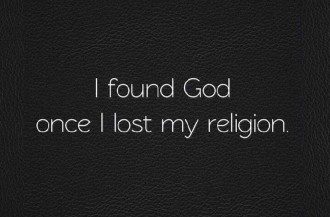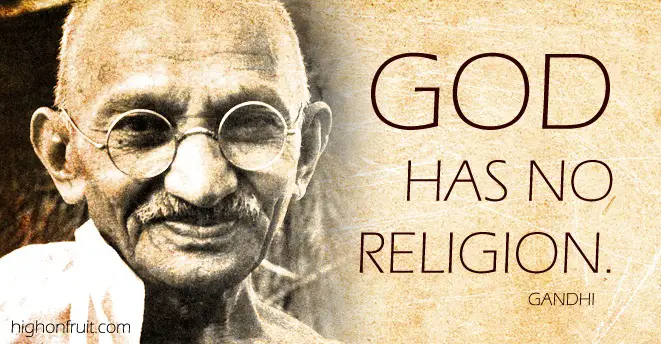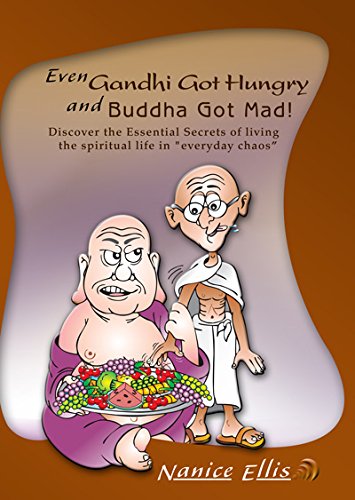By Nanice Ellis
Contributing writer for Wake Up World
Often our religious beliefs are handed down to us by family and culture, and by the time we are old enough to consciously choose, it’s too late because we are already brainwashed with pre-ordained beliefs that seem to be set in stone.
Ideally, the true purpose of any religion should be to facilitate a direct connection with the “Divine,” and to support spiritual awakening. Unfortunately, few, if any religions, fulfill this purpose. If they did, many more of us would be awake by now, or at least intimately connected to the Source of who we really are. Even with the prevalence of “new age” spiritual practices today, few of us have attained full spiritual awakening and direct Divine connection.
What’s wrong with this picture? Maybe that answer lies in the reasons why humanity seeks out religion, or structured spirituality, in the first place…
Seeking the answers to the unknown can be a scary business – where do we come from, why are we here, and especially, where do we go after departing? The further we travel down the “rabbit hole” in our quest for spiritual truth, the more lonely, confusing and frightening it can become. Religion preys on this fear and confusion; by providing premade answers designed to give us a false sense of security, it offers a reprieve from that inner quest, but in exchange for that spiritual crutch, we must give up spiritual sovereignty and the freedom to choose our own beliefs. We must give up the very thing it saves us from – finding our true selves.
In many ways, my spiritually convoluted childhood was a gift in disguise. Although my mother was raised strict Roman Catholic and my father was raised strictly Jewish, I was baptized Christian, and when it was time to send me to school, I was sent to a very Catholic school run by tyrant nuns. Neither my mom, nor my dad, considered that they were sending me to a Catholic school, where I would stand out like a sore thumb — with a very Jewish last name and a nose to match. I was treated differently by the nuns than the other kids but I was too young to understand why, and by the end of first grade, even the other kids formed an alliance against me. This overt judgment from nuns and peers went on for years, and as result, I did poorly in school, I had no friends, and I believed that there was something very wrong with me.
In fifth grade, the ongoing emotional stress caused me to have a nervous breakdown and, as a result, my parents enrolled me in public school, and also allowed me to figure out this “religion thing” on my own. By the time I was twelve, my immense search for truth was underway.
Up until that time, I had been taught that God was to be feared, and if you sin or break any commandments, you would be punished, and maybe even sent to a fiery hell to repent eternally. It was quite convincing, but something inside me said, it just wasn’t true.
My long and relentless search for spiritual truth delivered me to a sacred space that was, not surprisingly, void of all religion and the imprisoning dogma that keeps one from discovering the truth for oneself.
Why is it that religions often keep us from the very thing they should be doing? Instead of empowering us to a full connection with the Divine and supporting us to Wake Up and remember who we really are, they keep us asleep, buried under piles of disempowering beliefs that they programmed into our vulnerable minds.
If we are fighting to prove that we are worthy of God’s love or we must depend on a “go-between” (priest, rabbi, guru etc…) in order to communicate with God, how can we ever attain a deep spiritual connection with the Divine?
Programming Religion
Most religions operate through mechanisms of control, but often the dynamic of control is so covert that you cannot recognize it, and if you cannot recognize it, you might easily fall for the religion’s sales pitch. Or if you are a long time follower, leaving the religion can be like extracting yourself from emotional quicksand.
Most religions, and even some spiritual practices, keep people asleep through a program of shame and secrecy. The program includes an ingenious control formula, based on disempowering beliefs, such as unworthiness, powerlessness, judgment and exclusion, all resulting in painful and debilitating emotions that can last a life time.
Installing Beliefs
Most religions install beliefs about “right and wrong,” “good and bad” and “sinful and saintly,” causing followers to believe that their well-being or salvation is dependent on their behavior, and if they disobey, they are judged and punished with the equivalent of karma or an eternal afterlife of unwanted proportions, but that is not even the worst part! The defiance of your religious beliefs automatically invokes feelings of shame, guilt, obligation or regret. These feelings, or the fear of these feelings, can be a more powerful deterrent than even the threat of physical torture.
The deepest part of the control mechanism is through manipulating emotions, so that you actually punish yourself.
For example, if your religion says that it is wrong to have sex outside of marriage, and you have pre-marital sex, you will automatically punish yourself through feelings of deep shame, guilt, regret and unworthiness. In fact, if you even think about going against the religious doctrine, these powerful emotions will induce feelings of impending regret, and make you think twice.
The same goes for things like regular “attendance”, tithing/donations and any other conditions or requirements of your religion. Your fear of feeling guilt or regret controls your behavior and makes you do things that maybe aren’t right for you, or maybe keeps you from expressing your real self. The thing is, if you are emotionally manipulated, how can you even know what is best for you? Only through free-will can you ever be inspired by your own inner being.
Because the control is coming from inside you, in the form of your own beliefs and emotions, you probably don’t even realize that you are being controlled, which is what makes this type of control even more diabolical than if someone threatened you with a knife. When you can identify an external control source, it is clear that you are being controlled, but when you have been willingly programmed with beliefs, and these beliefs are causing painful emotions, it is almost impossible to discern that an external source is in control of your life.
Taking Advantage of the Young and Vulnerable
Most people are programmed with religious beliefs either when they are too young to question those beliefs or at a very vulnerable time in their lives. For example, people seek spiritual answers when they are experiencing emotional pain or confusion. Religions feed off this, and even take advantage of this vulnerability, seducing seekers with the promise of security and comfort, for this life and maybe even the afterlife.
Sacrificing Power in Exchange for Salvation
Most religions ask that you give away your power, and that you trust the religion and its leaders more than you trust yourself. You are taught that in order to connect with the Divine, you must depend on non-physical deities, or religious leaders. If you want a prayer answered or you seek forgiveness, you must use a “go-between” because you are not worthy, or pure enough, for direct communion with the Divine. Worst of all, the message is, “Don’t trust yourself,” and, as long as you don’t trust yourself, you remain powerless to external authority.
Ruled by Conditional Worth
In most religions, there is an unspoken decree of worthiness that all practitioners agree to. Your worth is dependent on how well you follow the rules of your religion – if you do as you are told, according to your religion, or your religious leader, you are deemed worthy, and if you go against, or question the rules or beliefs, you are deemed unworthy. Unworthiness induces deep feelings of shame which leads to secrecy.
Use of Judgment
The fear of being judged, shamed or the subject of gossip is commonly used to keep followers in line, creating secrecy and keeping followers from sharing their “indiscretions” with each other. Because judgment feels like death to the ego, we will do almost anything in order to avoid being judged. As a result, everyone pretends to be a good follower, while secretly hiding any “bad behavior,” and, because no one is sharing openly, it appears that everyone else is saintly, making it impossible for you to speak your truth.
No Room for Doubt or Questions
If you believe that your fellow practitioners will ostracize you, or report you to religious leaders, you will not likely share any feelings of doubt about the religion or its leaders – you will silently keep your questions or uncertainty to yourself, never knowing that your friend, neighbor or family member feels the same way. Judgment, and fear of being judged, supports division. As the saying goes, “Divide and conquer,” and, at all costs, keep those already conquered from coming together in rebellion. Silence and separation allow religious agendas to operate unnoticed.
Exclude Non-Believers
What about the threat of non-believers that are not part of the religion? Often, followers are well-trained in converting non-believers, with programmed answers for any, and all, objections that might come from the one they are trying to convert. Followers are often taught how to prey upon vulnerabilities, with promises of salvation, but, if that doesn’t work, the non-believer is viewed negatively, cast aside as ignorant and excluded. This type of righteousness, where the believer is right and the non-believer is wrong, is just another form of judgment and exclusion in the name of God.
The motto often is: “Either believe and join us or be excluded and judged as sinner.”
I am not saying that you should leave your religion, or even think about it – that is not the point. The point is, if you want to awaken to the truth of who you really are, you must free yourself from disempowerment. This means taking back your power from everyone and everything – including religion.
It might seem easy to blame a religion for keeping you powerless, asleep, or disconnected but religions only exist because we seek answers outside of ourselves. From the deepest perspective, religions are set up to fail you, so that eventually, you will look in the only place where you can ever find the answers you seek. Deep inside.
Religion says, “You are unworthy unless you meet certain conditions.”
Awakening reveals, “You are unconditionally worthy.”
Religion says, “You are powerless to external sources.”
Awakening reveals, “Your power is accessed as you take responsibility for your life.”
Religion separates, judges and excludes.
Awakening and Oneness are synonymous.
In awakening, you remember that who you really are is the Divine, and if you judge yourself, or others, you are really judging God.
How do you know if your religion or spiritual practice supports spiritual empowerment, Divine connection and spiritual awakening?
Most importantly, your religion or spiritual practice should work for you, and only you can decide what that means, but here are some suggestions for you to consider:
- Your spiritual practice gives you freedom, and space, to find your own answers, even if those answers disagree with the spiritual teachings.
- You are not judged, punished or excluded for thinking differently, or questioning ideas.
- Your spiritual practice moves you toward love and oneness, providing the space for you to forgive yourself and others, as you let go of old heavy baggage which no longer serves you.
- The spiritual teachings uplift you to new heights of awareness, while also inspiring you to express yourself.
- Spiritual beliefs are offered through lessons of empowerment, and not through fear of karma, punishment or any form of disempowerment, nor should you be manipulated through guilt, obligation, or impending regret.
- Your spiritual teacher does not encourage dependency on him or her, tell you what to do, how to think or make other spiritual teachings wrong or less than.
- You are not asked to judge, reject or exclude others in order to remain in the religion, nor are you punished for loving those who don’t obey the rules of your religion.
- You feel honored and respected by your teacher and peers, and you never feel as if the teacher, or spiritual practice, has power over you, or that your worthiness is in question. .
- Your practice empowers you to discover who you really are, and supports you in developing an intimate and personal relationship with the Divine, where you experience yourself as unconditionally loved.
- If your intention is spiritual awakening, your spiritual practice must not only empower you to discover the door of awakening, it must also encourage you to let go so that you can enter. In order to fully awaken, you must be willing to let go of even the sacred practice that got you there.
The bottom line is, does your spiritual practice direct you inward? Does it make you feel closer to the Divine? Does it empower you?
Don’t throw the baby out with the bathwater
If you have left your religion, or you are thinking of leaving, don’t confuse leaving the religion with leaving God. Just as the saying goes, “Don’t throw the baby out with the bathwater,” Don’t throw God out with the religion. God has been tainted by all sorts of disempowering beliefs – from crazy rules to unreasonable nonsense and everything in between. You can leave all that behind and you can find God on your own terms, in a way that feels particularly right for you.
Losing community
Sometimes we stay in a religion well past its expiration date because if we leave, it probably also means that we must leave our community. Tolerating rules and dogma that no longer fit for us might seem like a small price to pay in exchange for the love and support of community, but that price is much higher than it appears. If you are compromising your freedom, hiding your true feelings, or constricting your expression in order to be accepted in a community, sooner or later, you will likely experience deep spiritual wounds that arise from betraying your own true spirit.
Yes, there might be a period of time where you don’t have the support of community, but I promise, your most ideal community is out there waiting for you. A massive wave of people all over the world are waking up, and leaving situations and environments that no longer fit. Just like you, they are looking for that place where they belong. It is time to come together to form empowering paradigms of community where we can all thrive, and be who we came here to be.
Stay tuned for part two of this article, “How to find God on your own terms, with or without religion?”, coming soon to Wake Up World.
Copyright: Nanice Ellis 2019. All rights reserved
Free 7-Part Spiritual Awakening Series with Nanice
No matter where you are on your path, this intensive series will support your journey to awakening.
Get started now at www.nanice.com/awaken.
Even Gandhi Got Hungry and Buddha Got Mad
A book by author Nanice Ellis…
It’s easy to express your spirituality when life is going the way you want it to, but what happens in the middle of everyday chaos, when your days are not long enough, your car breaks down, and your significant other is driving you crazy?
Nanice Ellis’ book “Even Gandhi Got Hungry and Buddha Got Mad!” is not about Gandhi… or Buddha — it is a book about you and your spiritual journey through the chaos of daily life, the challenge of the modern day seeker. This book will help you to discover the secrets to making every day the spiritual adventure it is meant to be, and what it really means to be a spiritual being having a very human experience…
“Even Gandhi Got Hungry and Buddha Got Mad” is available here on Amazon.com. Or check out Nanice’s full catalogue of books here on Nanice.com.
About the author:
Nanice Ellis has been a professional Life Coach for over 20 years, successfully coaching women and men from all over the world. She is also an author, Theta Healer and Master Neuro Linguistic Practitioner.
Helping people to make quantum jumps in their lives, Nanice’s very unique coaching style is often referred to as the “Nanice Effect”. By using powerful and proven manifestation techniques, Nanice coaches people to tap into the power of the Universe and live their dreams, bridging the gap from the imagination to the realization of that dream. She works with leaders, coaches, healers and anyone who wants to live life to the fullest. You can learn more about the coaching programs offered at: Coaching Programs with Nanice.
Nanice is the author of several books, including the inspirational “The Infinite Power of You!” and “Even Gandhi Got Hungry and Buddha Got Mad!”, and her latest book, “Is There a White Elephant in Your Way? The Guidebook for Awakening and Self Empowerment” She is also the host of radio show Chai with Nanice. Her books are available at Nanice.com/6/Books and right here on Amazon.
Connect with Nanice at Nanice.com.
Recommended articles by Nanice Ellis:
- Raising Awake Children in a Broken School System
- Escaping the Matrix of Depression – The Truth About Depression Shall Set You Free
- Tired of Being a Negativity Sponge? 12 Ways to Prevent Energy Infiltration and Reclaim Your Energy
- Is Ayahuasca Mother Nature’s ‘Red Pill’?
- Overcoming Negative Thinking – The #1 Cause of Chronic Depression
- How To Help Others Spiritually Awaken
- How to Heal Emotional Trauma
- The 5 Stages of Awakening – Signposts and Pitfalls on the Path of Consciousness
- Are You More Awake Than Your Family? 12 Ways to Heal Relationships When Your Family Is Still Asleep
- Why You Should Forgive Your Parents… and How To Do It!

If you've ever found value in our articles, we'd greatly appreciate your support by purchasing Mindful Meditation Techniques for Kids - A Practical Guide for Adults to Empower Kids with the Gift of Inner Peace and Resilience for Life.
In the spirit of mindfulness, we encourage you to choose the paperback version. Delve into its pages away from screen glare and notifications, allowing yourself to fully immerse in the transformative practices within. The physical book enriches the learning process and serves as a tangible commitment to mindfulness, easily shared among family and friends.
Over the past few years, Wake Up World has faced significant online censorship, impacting our financial ability to stay online. Instead of soliciting donations, we're exploring win-win solutions with our readers to remain financially viable. Moving into book publishing, we hope to secure ongoing funds to continue our mission. With over 8,500 articles published in the past 13 years, we are committed to keeping our content free and accessible to everyone, without resorting to a paywall.











